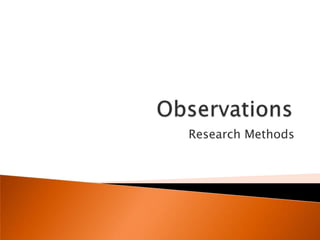
SociologyExchange.co.uk Shared Resource
- 2. To have an understanding of observation techniques. To know the strength's and limitations of this type of study.
- 3. In pairs Imagine that you were going into the Big Brother house. Brainstorm ways that you would change your behaviour. What wouldn’t you do? What would you do? Discuss in pairs. 5 minutes. http://www.online-stopwatch.com/bomb- countdown/
- 4. When conducting participative observational research the observer must be involved in the study groups everyday activities. They will notice how they behave and how they speak. A Number of issues can arise through this method.
- 5. Non- participant: watches from a distance and is not directly involved with participants. Participant : Researcher interacts with the study group being observed. Two types of participant observation: 1) Covert – subjects do not know they are being studied. 2) Overt - Subjects are aware they are being studied.
- 6. Research ethics :Duty of care the researcher owes to participants. Ethical principles : Participants should be fully informed. Participants should not be harmed. Participants should not be specifically identified.
- 7. This is a conflict between the ethical principles and the aim of the research. If the researcher asks for consent to observe the participant's then they may act differently – Demand characteristics. If they don’t ask and participants are being observed they may act more naturally.
- 8. Participant observation doesn't work unless the researcher gains access to the group. Many groups don't want to be studied. May be hard to get a true representation of the group. Participant observations maybe more effective as a longitudinal study.
- 9. Researchers want to observe people within their natural environment. They may want to take notes of what they say and do but also they may want to record information- this can be an ethical issue. Sometimes the observer must play an active role within the group rather in order to gain more information.
- 10. Getting access – You may not be able to access the environment you wish to observe. Staying in - hard to maintain trust and keep up your false identity. Getting out : Not easy to stop participating with group.
- 11. High Validity Can study social interaction both verbal and non verbal. Empathy Researcher can see from the same perspective as the group. Develops trust therefore more information could be shared. Revealing secrets etc.
- 12. Low reliability. Hard to replicate. Often samples are not representative- difficult to generalise. Time consuming Lots of pressure on individual Data will be hard to quantify.
- 13. “ Glasgow gangs” James Patrick (1973) “ Wheeling and dealing” Alder (1985) “Italian gangs” (1973) William F Whyte “ Cocaine Kids” ( 1986) Williams.
- 14. http://video.google.com/videoplay?docid= 2218940492996010738 During the video you are going to take notes on : Who is he studying? How is he doing it? Any problems? Any ethical issues ? Strengths of the study
- 15. Design your own observational study. Include : Who you are going to observe. What your looking for. Benefits of this type of study. Problems you may face – ethics. Due in 17th October.